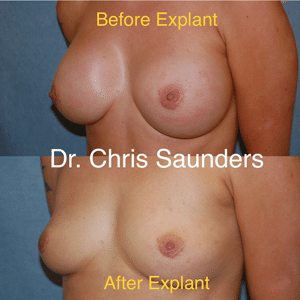Philadelphia, Pa
If you are considering removing your breast implants, I have written three educational writings that will help with your understanding of the operation and your choices. Sometimes after a period of time, women decide they want to remove their implants. This removal is called explantation or explant. A doctor who performs this operation is called a breast explant surgeon. A women might want explant because of the development of a problem or just because she has chosen to take them out. These writings will be a guide for you during this process. It will help you learn information and your choices.
After breast augmentation or breast enlargement with a lift, most women have high satisfaction and good results. But with the passage of time, feelings change and some people make the decision to have implant removal or to consider it. There are a lot of reasons to consider this operation. These include but are not limited to:
1. Complications from surgery (i.e.- deflation, scar tissue, poor shape)2. The desire to be smaller or more natural3. Concerns about breast implant illness (BII), cancer, or disease4. Feelings that you are too old for implants
1- Complications from surgery:
I will review breast enlargement risks or complications and their relevance for breast implant removal. As I have said, breast augmentation is an extremely successful operation. But risks or problems do occur. Deflation over 10 years is only 1-2%. But implants can deflate requiring corrective surgery. Some women will develop shape issues and want their implants removed, instead of fixing the shape problem. Also, scar tissue or capsular contracture can develop. This is called hardening of the implants. These problems are not frequent, but when they happen, surgery can be necessary.
When complications arise, implant removal can be a choice that decreases expenses and simplifies the operation. When implants deflate, removal can be a quick fix that is simple and easy. The biggest problem with this choice is actually wishing you did not remove them. Many woman will be concerned about being too small. The same feelings that led to you getting the implants could return. You aren’t harmed by the removal, but you could feel too small and wish you hadn’t removed them.
When shape issues or scar tissue forms, implant removal can simplify the choices. Capsular contracture surgery involves complete removal of the scar tissue called a complete capsulectomy. This is reviewed in Part 2. If you remove the implants, you eliminate any chances of the scar tissue returning. This is an advantage of implant removal versus replacing the implants right away after complete capsulectomy. Once agin, concern over being too small afterwards is a factor to consider if implants are removed. Sometimes unnatural shapes can be corrected by implant removal. This is particularly true when the implant is in a poor or wrong location. This is called dropping out of the pocket.
2- The desire to be smaller or more natural:

3- Concerns about Breast Implant Illness (BII), cancer, or disease:
My feelings are very clear. If a women wants her implants out because of fear of disease or illness, then I will help her. I will perform the operation in the most meticulous manner and with the best care to help her with all aspects of her surgery and recovery. If this includes capsule removal or En Bloc capsulectomy, I will recommend the best operation for her.
However, the above being said, breast implants are FDA approved and widely accepted as being safe. It is believed by the FDA and most doctors, that smooth silicone and saline breast implants are completely safe and do not cause illness or disease. Allergan company has textured implants that have recently been recalled by the FDA. This is over concerns of ALCL. I don’t use these types of textured implants. Women who have these implants might wish to have removal as an option.
I understand a woman can have fear of her implants, and I understand her desire to remove them. In this case, I will give her my best surgical abilities to remove them and the capsule in the safest and most meticulous manner. In my experience with my patients, I have had a large majority of patients feel much better with time after the procedure. I can not guarantee this of coarse, but my experience has been one of excellent success and excellent results in helping woman with breast implant illness and other concerns.
4- Feeling that you are too old for implants:
Some patients will feel that they are too old for breast implants. The truth is you are never too old. It is common for me to hear woman say they will stop caring about their breasts at 70 years old or some other age. The truth is this never happens. You will always care about your breasts and other aspects of your beauty. You will always care about your hair, your skin, your face and body, and your breasts. This concern never dies, although some think it will.
Breast implants are successful in women of all ages. This includes women in their 80’s who just love their breast augmentation. However, if someone wants their implants removed, I will help them in the best surgical manner and care. A risk after surgery is wishing that the implants were not removed. One must be careful about wanting the implants out, only to wish they had not done so after they are healed. The decision to remove them should be done with much forethought.
Part 2 and 3 are educational writings that should also be reviewed. Part 2 reviews the actual operation of breast implant explant and recovery. It also discusses the capsule in detail, such as En Bloc removal. Part 3 reviews the topic of a lift or mastopexy at the same time as removal. Patients might be surprised about this topic and should read this too. As always, I recommend that you come in for a comprehensive consultation. This allows me to talk to you, examine you, and review options, techniques, risks, and recovery in detail.


